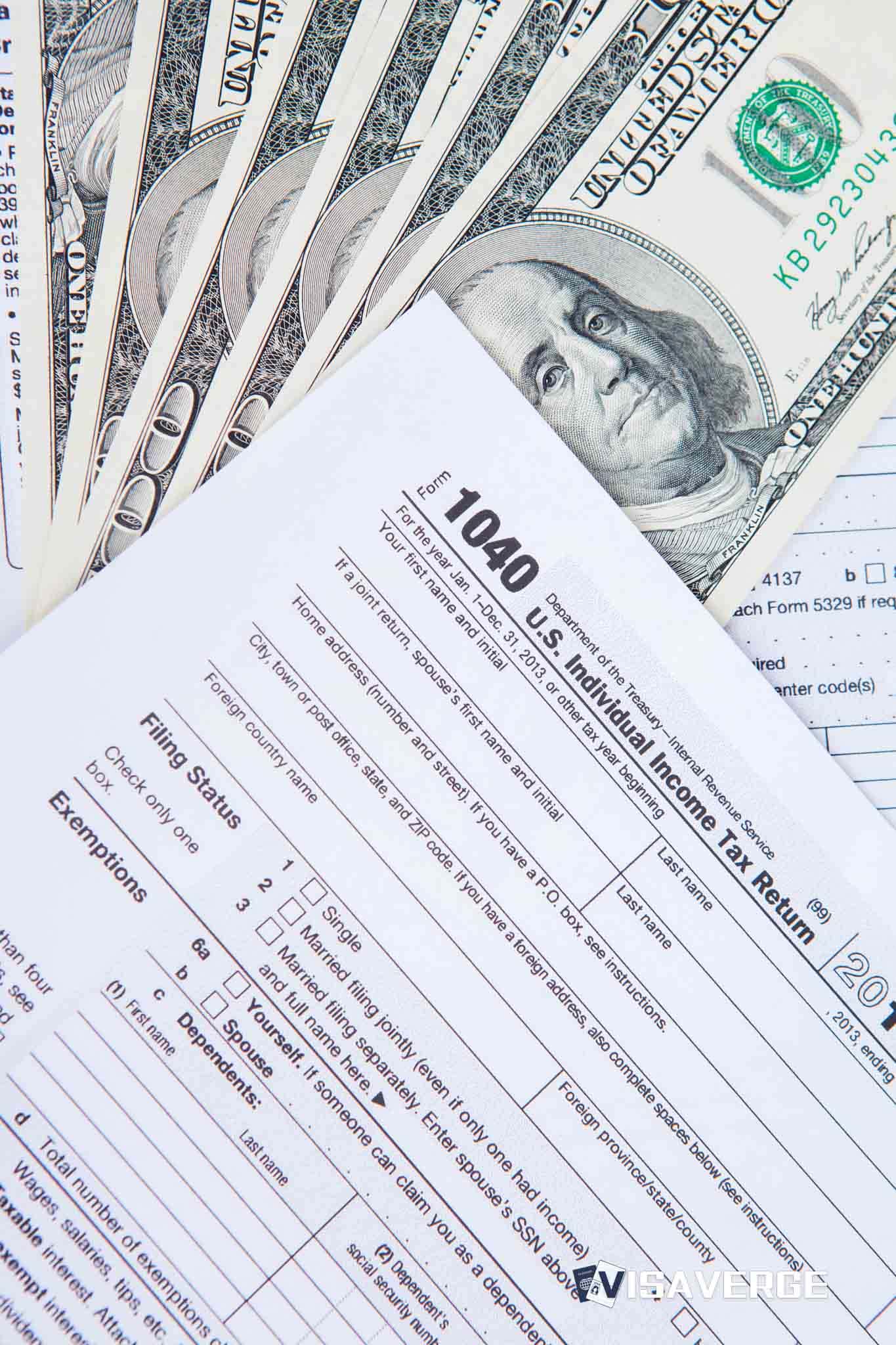Navigating Tax Implications for Your Child’s U.S. Savings Account
Are you a proud parent who has set up a savings account for your little one? Here’s a proverbial pat on the back for thinking ahead about your child’s financial future. If your child was born in the U.S., there are specific tax considerations you’ll want to keep in mind to ensure that you remain compliant with tax laws and perhaps even take advantage of potential tax benefits. Let’s dive into some key points regarding child savings account tax considerations.
Understanding the Kiddie Tax
One of the primary tax rules you’ll encounter is the so-called “Kiddie Tax.” This tax rule is intended to prevent parents from avoiding taxes by shifting large amounts of investment income to their children, who are typically in a lower tax bracket. Children under the age of 19 (or under 24 if a full-time student) can be affected by this rule if they have unearned income.
For 2023, the first $1,150 of a child’s unearned income is considered tax-free, the next $1,150 is taxed at the child’s rate, and any unearned income above $2,300 is taxed at their parents’ marginal tax rate. It’s important to recognize that the Kiddie Tax applies only to unearned income — typically interest, dividends, and capital gains — and not to earned income from things like a part-time job.
Gift Tax Considerations
When you deposit money into your child’s savings account, it’s crucial to be aware of the gift tax rules. As of 2023, the annual exclusion for gifts is $16,000 per recipient. This means that you and your spouse could each gift up to $16,000 to your child’s savings account without triggering any gift tax consequences or even having to report the gift to the IRS.

If you exceed this amount, it doesn’t necessarily mean you’ll owe taxes immediately. However, you will need to file a Form 709 to report the gift, and it could affect your lifetime gift and estate tax exclusion.
Reporting and Filing Requirements
If your child’s savings account earns a significant amount of interest — more than $10 of interest annually — you’ll receive a Form 1099-INT from the bank, which needs to be reported on the child’s tax return if they’re required to file. Alternatively, if your child’s interest and dividend income is less than $11,000, it may be possible to include it on your return using Form 8814, alleviating the need for your child to file their own return.
The Benefits of a 529 College Savings Plan
If your ultimate goal is to use the savings for educational purposes, a 529 college savings plan might offer better tax advantages. These plans are specifically designed to foster savings for education, and the earnings in the account are not federally taxed when used for qualified education expenses. Additionally, over 30 states offer residents a full or partial tax deduction or credit for 529 plan contributions.
Preparing for the Future
Saving for your child’s future is a wise and loving choice, but it’s essential to be mindful of the tax implications to maximize the benefits of your savings efforts. Here are some tips to keep your approach tax-efficient:
- Stay informed about interest income and report it accurately.
- Be mindful of the annual gift tax exclusion limits.
- Consult the IRS guidelines or a tax professional if you’re considering reporting your child’s income on your tax return.
- If education savings is your goal, explore the advantages of a 529 plan.
For detailed information on tax filing and forms, you can visit the official IRS website.
Remember, the key to navigating the U.S. savings account for child tax rules is staying informed and proactive about your responsibilities as a taxpayer. By doing so, you can help secure your child’s financial future while also adhering to the pertinent tax regulations.
Still Got Questions? Read Below to Know More:
Can I put my tax refund directly into my child’s savings account without it counting toward the gift tax limit
Certainly! If you’re receiving a tax refund from the IRS and considering depositing it into your child’s savings account, here’s what you should know about the gift tax implications:
- Gift Tax Exclusion: For the tax year 2023, the IRS allows you to give up to $17,000 per recipient without having to pay gift tax or even report the gift. If you and your spouse are gifting jointly, you can collectively give $34,000 per recipient. This is known as the annual gift tax exclusion.
- Direct Deposit of Refund: When depositing a tax refund, you can elect to have it directly deposited into one or multiple accounts. However, if the refund exceeds the annual gift tax exclusion limit when deposited into your child’s account, it may be considered a taxable gift.
- Reporting Taxable Gifts: If your refund—or any other gift—exceeds the annual exclusion limit, you’d generally need to report it using Form 709, the United States Gift (and Generation-Skipping Transfer) Tax Return. However, actual tax might not be due unless you’ve exceeded the lifetime gift and estate tax exemption amount, which is significantly higher.
It is important to keep records of any large contributions to your child’s savings account. If the amount is within the annual exclusion limit, the transfer should not cause any gift tax obligations. For authoritative information and updates on gift tax limits, consult the IRS’ Frequently Asked Questions on Gift Taxes page (https://www.irs.gov/businesses/small-businesses-self-employed/frequently-asked-questions-on-gift-taxes).
If your tax refund is comfortably below the annual exclusion limit, then depositing it into your child’s savings account does not necessitate any gift tax reporting. However, if it’s above the threshold, remember to complete the necessary IRS forms to remain compliant. Always consult with a tax professional if you’re unsure about your specific situation.
Does opening a savings account for my child affect my tax return if I’m already claiming them as a dependent
Opening a savings account for your child does not directly affect your tax return just because you’re claiming them as a dependent. Generally, the act of creating a savings account under your child’s name won’t change your tax situation. However, the income generated from that account could have some tax implications. Here are key points to consider:
- Interest Income: If the savings account earns interest, this income may be taxable. For children under 19, or full-time students under 24, the “kiddie tax” rules may apply. According to the IRS, “The ‘kiddie tax’ rules are intended to prevent the splitting of incomes among family members to take advantage of lower tax rates.”
- Tax Filing Requirements: Your child might need to file an income tax return if the interest and other investment income exceed certain thresholds. For 2022, this threshold is $2,300.
- Parent’s Tax Return: If the child’s interest and dividend income including capital gain distributions, total less than $11,000, the child’s parent may be able to include that income on the parent’s return rather than having the child file a return. To do this, the parent must use IRS Form 8814.
For the official IRS guidance, you can check their website: IRS Kiddie Tax Rules.
Remember, setting up a savings account for your child with you as the custodian doesn’t mean the income becomes your taxable income. It remains the child’s income and will be taxed either at the child’s tax rate or at your rate if the kiddie tax applies. Always consult with a tax professional or read the latest IRS guidelines for the year you’re preparing your taxes, to ensure compliance with current tax laws.
If my teenager has a summer job, does the money they save from their paychecks also fall under Kiddie Tax rules
Certainly! When your teenager has a summer job, the money they earn and save from their paychecks is generally their own and not subject to the “Kiddie Tax” rules as long as it’s earned income. The Kiddie Tax, which is a tax on a child’s investment and unearned income, comes into play when a child has income other than wages or salaries.
Here are the key points to consider:
– The Kiddie Tax applies to unearned income over a certain amount. For 2022, the threshold is $2,300, and for 2023, it is subject to adjustment for inflation.
– Earned income, which includes wages, salaries, tips, and other payments for personal services, is taxed at the child’s tax rate, not the parents’, which means the money your teenager saves from their summer job wouldn’t fall under the Kiddie Tax rules.
– Savings from a summer job that generate interest, dividends, or other investment income could potentially be subject to the Kiddie Tax if those earnings exceed the IRS threshold.
For more detailed and authoritative information, please review the IRS’s page on the Kiddie Tax here.
Remember, if your teenager’s investment income is substantial, it might be a good idea to consult with a tax professional to understand the implications fully. And if you’re wondering how this might intersect with immigration matters, such as the responsibilities of non-citizen dependents, you can look to official government immigration resources for guidance on the tax obligations of immigrants and their families.
I accidentally exceeded the $16,000 gift limit to my child’s account this year; what do I need to do now to correct it
If you’ve accidentally exceeded the annual gift exclusion limit of $16,000 to your child’s account, there is a process you can follow to correct it:
- File a Gift Tax Return (Form 709): You’ll need to file a United States Gift (and Generation-Skipping Transfer) Tax Return, also known as Form 709, for the year in which you made the gift. This form is used to report gifts that exceed the annual exclusion limit and to apply any of these excess amounts toward your lifetime gift and estate tax exemption. This exemption allows individuals to give away significant amounts during their lifetime or at death without incurring a tax. As of 2023, the lifetime exemption amount is over $11 million per individual.
- Use Your Lifetime Exemption: By filing Form 709, you can elect to use some of your lifetime exemption to cover the amount that’s over the annual gift exclusion. Assuming you have not used up your lifetime exemption, this means you would not have to pay any gift tax, even though you’ve exceeded the annual limit.
-
Keep Proper Documentation: It’s important to keep a copy of the Form 709 and any related documents as part of your tax records. If the IRS has any questions in the future, you’ll need to provide this as evidence of your use of the lifetime exemption.
“Don’t worry if you’ve gone over the limit; the annual exclusion is just one part of a larger system of gift and estate taxes. Utilizing the lifetime exemption can ensure that no taxes will be owed, but proper reporting is key.”
To get started on correcting your gift, visit the IRS website for the necessary forms and instructions: IRS Form 709. If needed, it is also advisable to consult with a tax professional who can provide personalized guidance based on your specific situation.
My child won a scholarship that covers their tuition. Can we put the excess money in a savings account, and what are the tax implications
Certainly! If your child has won a scholarship that covers more than just tuition, such as room and board, the excess funds over the cost of tuition, fees, books, and supplies can be considered taxable income. Here’s what you need to know about saving that money and the tax implications:
- Savings Account: You can absolutely deposit the excess scholarship money into a savings account. The key thing to remember is that even if this money is saved or invested, it doesn’t change the fact that it could be taxed as income.
- Tax Implications: The portion of the scholarship used for tuition, fees, books, and required equipment or supplies is not taxable. However, funds used for other expenses, such as room and board or travel, can be taxed.
- The IRS states, “If you use part of the scholarship or fellowship to pay for room and board, travel, or other expenses, that part is taxable.”
- For more details, the IRS Publication 970 (Tax Benefits for Education) is a valuable resource: IRS Publication 970.
- Reporting to the IRS: When filing a tax return, it would be necessary to report the taxable portion of the scholarship. You’ll use Form 1040 and possibly Schedule 1, depending on individual circumstances. The exact reporting requirements can vary, so checking with a tax professional or the IRS guidelines is prudent.
Remember to maintain detailed records of how the scholarship is spent and consult the IRS guidelines or a tax professional for assistance with your specific situation. Keep in mind that tax laws can change and it’s important to stay updated with the latest information from the IRS or an experienced tax advisor.
Learn today
Glossary
- Kiddie Tax: A tax rule designed to prevent parents from avoiding taxes by shifting investment income to their children who are usually subject to a lower tax bracket. Children under the age of 19 (or under 24 if a full-time student) with unearned income may be affected by this rule. The Kiddie Tax applies to unearned income, such as interest, dividends, and capital gains, and not earned income from sources like a part-time job.
- Gift Tax: A tax on the transfer of property or money by one person to another while receiving nothing or less than the full value in return. Gift tax rules require individuals to report gifts over a certain value to the IRS. As of 2023, the annual exclusion for gifts is $16,000 per recipient, meaning you can gift up to $16,000 to your child’s savings account without triggering gift tax consequences.
-
Form 709: A form that individuals need to file with the IRS to report gifts that exceed the annual exclusion for gift tax purposes. If you exceed the annual gift tax exclusion, you must file Form 709 to report the gift. Although exceeding the exclusion doesn’t immediately result in owing taxes, it may affect your lifetime gift and estate tax exclusion.
-
Form 1099-INT: A form provided by banks and other financial institutions to taxpayers who earn more than $10 in interest income in a given tax year. Parents or children with a significant amount of interest income from a child’s savings account will receive Form 1099-INT, which must be reported on the child’s tax return if they are required to file.
-
Form 8814: A form that allows parents to report a child’s interest and dividend income on their own tax return, bypassing the need for the child to file their own return. If a child’s interest and dividend income is less than $11,000, it is possible for parents to include it on their own return using Form 8814.
-
529 College Savings Plan: A specialized savings plan designed to help individuals save for qualified education expenses. Contributions to a 529 plan grow on a tax-deferred basis, and when used for qualified education expenses, the earnings are tax-free at the federal level. In addition, many states offer tax deductions or credits for contributions made to 529 plans.
-
Tax-efficient: A term used to describe strategies, investments, or decisions that minimize the amount of taxes owed or maximize tax benefits. Being tax-efficient means taking advantage of available deductions, credits, exemptions, and other provisions within the tax code to reduce overall tax liability. It requires careful planning and consideration of tax implications.
Note: It is essential to consult with a tax professional or refer to IRS guidelines for specific advice tailored to your situation. This glossary provides general definitions and explanations of tax-related terms but should not be used as a substitute for professional advice.
Now that you’re armed with the essential knowledge about tax implications for your child’s U.S. savings account, you can confidently navigate the complexities and make informed decisions. Remember to stay on top of interest income, be mindful of gift tax limits, and explore the benefits of a 529 college savings plan. If you want to delve deeper into this topic or explore other helpful immigration-related content, head over to visaverge.com. Happy savings and happy exploring!









